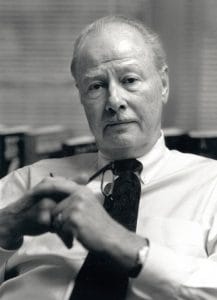Born to a school principal and a teacher, Loomis loved books, explaining upon his retirement, “I was able to associate with great minds through their books.” He made that his profession, working directly with the “great minds” as a book editor. He was hired at Random House in 1957, and worked with some of the top authors of the day, including Daniel J. Boorstin, Shelby Foote, Seymour Hersh, Jim Lehrer, Neil Sheehan, William Styron, Calvin Trillin, and Maya Angelou, who Loomis convinced to write her 1969 autobiography, I Know Why the Caged Bird Sings — and she stayed on to write 30 more books for Loomis to edit. “They say he’s an old-fashioned editor,” said Trillin, “but I’m not sure there were many of those kinds of editors even 30 or 40 years ago.” Loomis “taught me and oh so many others what writing a book was all about,” Hersh said. Loomis himself described his editing style this way: “You have to turn your collar around like a priest. You offer a lot of praise, you have confession and you have faith, and pretty soon they might trust you enough to know that you’re not trying to make the book in your own image. It’s their book.”

“He would hand me the first one off the press,” said Sam Tanenhaus, editor of The New York Times Book Review and the author of two books edited by Loomis, including a biography of Soviet spy Whittaker Chambers. “I remember when I got the Chambers book he said, ‘Can you believe it? Here it is.’ Because it was the physical book and that mattered more than anything else. It mattered more than ad campaigns, and sales figures, and publicity.” Trillin remembered Loomis’s feedback on one book: “He says, ‘It’s almost there. Everything is great — but the beginning and the end.’” Neil Sheehan’s book A Bright Shining Lie: John Paul Vann and America in Vietnam, was supposed to be 100,000 words. When Sheehan turned it in, it was 360,000 words. Loomis worked with the author for a year to trim it by 110,000 words. “Writers tend to resist editing, but you trusted Bob and knew how much he cared about your work,” Sheehan said. “That book would not be the book it is without Bob.” The book went on to win the 1988 National Book Award for Nonfiction, and the 1989 Pulitzer Prize for General Non-Fiction. “He was part of this generation that’s almost all gone now,” said biographer Robert Caro. “Men and women who cared about every word. And he was one of the greatest of them.” Loomis didn’t retire until he was 85; by then he was an executive vice president of Random House, and had worked there for 54 years. He died on April 19 in New York after a fall, at 93.
